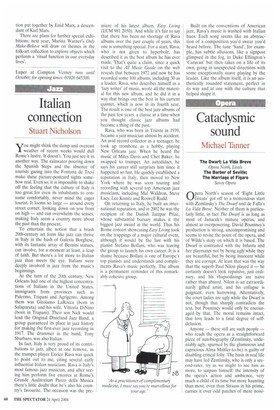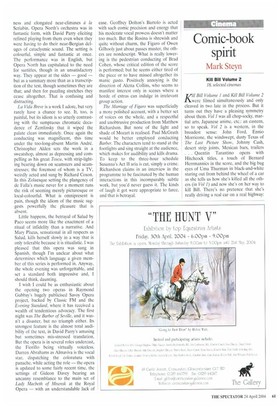Cataclysmic sound
Michael Tanner
The Dwarf; La Vida Breve Opera North, Leeds The Barber of Seville; The Marriage of Figaro Savoy Opera
Opera North's season of 'Eight Little Greats' got off to a tremendous start with Zemlinsky's The Dwarf and de Falla's La Vida Breve. Neither of them is particularly little, in fact The Dwarf is as long as most of Janacek's mature operas, and almost as overpowering. David Pountney's production is strong, uncompromising and seems to revise the point of the opera, and of Wilde's story on which it is based. The Dwarf is contrasted with the Infanta and her playmates not by being ugly while they are beautiful, but by being innocent while they are corrupt. At least that was the way that the superb Paul Nilon played it — he certainly doesn't look repulsive, just ordinary, and his rhapsodisings are naive rather than absurd. Nilon is an extraordinarily gifted artist, and his collapse is poignant, even harrowing. Alternatively, the court ladies are ugly while the Dwarf is not, though that sharply contradicts the text, but Pountney would only be encouraged by that. The moral remains intact, that love leads to a fatal degree of selfdelusion.
Anyone — there still are such people — who reads the opera as a straightforward piece of autobiography (Zemlinsky, undeniably ugly, spurned by the glamorous and capricious Alma Mahler-to-be) is guilty of disabling critical folly. The basis in real life may have led Zemlinsky, who is only a second-rater, try as we might to see him as more, to surpass himself: the intensity of the opera's action and ambience, very much a child of its time but more haunting than most, even than Strauss in his prime, carries it over odd patches of mere noisi
ness and elongated near-climaxes a la Scriabin. Opera North's orchestra was in fantastic form, with David Parry eliciting refined playing from them even when they were having to do their near-Bergian deluges of cataclysmic sound. The setting is colourful, simple and fantastic at once. The performance was in English, but Opera North has capitulated to the need for surtitles, though in an unsatisfactory way. They appear at the sides — good — but as a summary more than as a transcription of the text, though sometimes they are that; and then for puzzling stretches they cease altogether. That is confusing and distracting.
La Vida Breve is a work I adore, but very rarely have a chance to see. It, too, is painful, but its idiom is so utterly contrasting with the sumptuous chromatic decadence of Zemlinsky that it wiped the palate clean immediately. Once again the conducting was magnificent, this time under the too-long-absent Martin Andre. Christopher Alden sets the work in a sweatshop, almost as depressing and compelling as his great Tosca, with strip-lighting bearing down on seamsters and seamstresses; the foremost of whom is a TV, weirdly acted and sung by Richard Coxon. In this Zolaesque setting the plangency of de Falla's music never for a moment runs the risk of seeming merely picturesque or local-colourful. What is omnipresent is pain, though the idiom of the music suggests powerfully the pleasure that is absent.
Little happens, the betrayal of Salud by Paco seems more like the enactment of a ritual of infidelity than a narrative. And Mary Plazas, sensational in all respects as Salud, kills herself slowly in a way that is only tolerable because it is ritualistic. I was pleased that this opera was sung in Spanish, though I'm unclear about what determines which language a given member of this series is performed in. Anyway, the whole evening was unforgettable, and set a standard both impressive and, I should think, daunting.
I wish I could be as enthusiastic about the opening two operas in Raymond Gubbay's hugely publicised Savoy Opera project, backed by Classic FM and the Evening Standard, where it has received a wealth of tendentious advocacy. The first night was The Barber of Seville, and it wasn't a disaster, but no triumph either. Its strongest feature is the almost total audibility of the text, in David Parry's amusing but sometimes mis-stressed translation. But the opera is in several roles undercast, the Fiorillo being virtually voiceless. Darren Abrahams as Almaviva is the vocal star, dispatching the coloratura with panache, while acting the role — the opera is updated to some fairly recent time, the settings of Gideon Davey bearing an uncanny resemblance to the main set of Lady Macbeth of Mtsensk at the Royal Opera — with an understandable lack of
ease. Geoffrey Dolton's Bartolo is acted with such comic precision and energy that his moderate vocal prowess doesn't matter too much. But the Rosina is shrewish and quite without charm, the Figaro of Owen Gilhooly just about passes muster, the others are nondescript. What is really lowering is the pedestrian conducting of Brad Cohen, whose critical edition of the score is performed; but he seems either tired of the piece or to have missed altogether its manic gusto. Positively annoying is the direction of Aletta Collins, who seems to manifest interest only in scenes where a horde of extras can indulge in irrelevant group action.
The Marriage of Figaro was superficially a more polished account, with a better set of voices on the whole, and a respectful and unobtrusive production from Matthew Richardson. But none of the light and shade of Mozart is realised. Paul McGrath would be better employed conducting Barber. The characters tend to stand at the footlights and sing straight at the audience, which makes for audibility and kills drama. To keep to the three-hour schedule Susanna's Act II aria is cut, simply a crime. Richardson claims in an interview in the programme to be fascinated by the human interactions in this incomparably subtle work, but you'd never guess it. The kinds of laugh it got were appropriate to farce, and that is betrayal.



















































































 Previous page
Previous page